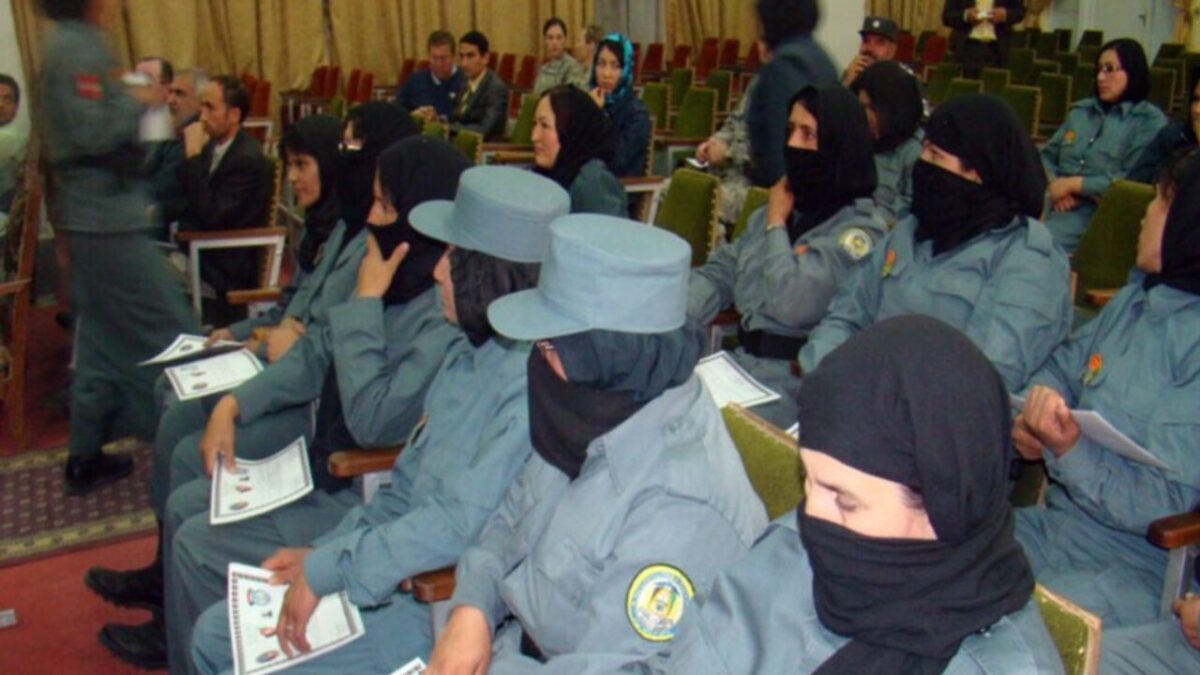Taliban authorities have threatened Afghan women who served in the police under the previous government, placing them in danger, Human Rights Watch reported Thursday.
The organization’s 26-page report, Double Betrayal: Abuses against Afghan Policewomen Past and Present, details the harassment and abuse many former policewomen face, forcing many into hiding since the Taliban took power in August 2021. “These women have faced threats from Taliban authorities for their past service and must live in fear of being identified,” Human Rights Watch said.
The report also exposes how, under the previous government, Afghan policewomen experienced widespread sexual harassment and assault, including rape, by male colleagues and supervisors who were rarely held accountable.
“Afghan policewomen have been doubly betrayed, first by a government that allowed unchecked abuse and now by countries unwilling to offer them protection,” said Fereshta Abbasi, Human Rights Watch’s Afghanistan researcher. Former policewomen described suffering from ongoing psychological trauma due to past abuse and fear of retribution from both their families and the Taliban.
Based on interviews with 24 former policewomen, the report draws from both in-person and remote conversations with women in Afghanistan and abroad, as well as insights from former UN officials and civil society activists.
Human Rights Watch noted that former policewomen reported receiving threats from Taliban officials, often being told to report for questioning. Some women recounted instances where Taliban forces conducted abusive searches of their homes, damaging property and assaulting relatives. “Taliban threats extend beyond policewomen, impacting their families and their safety,” Abbasi said.
Human Rights Watch documented numerous accounts of sexual violence that Afghan policewomen endured under the previous government, often from their superiors. “The harassment was pervasive and well-known, even among the countries that supported the former government,” the report stated. Abbasi emphasized that accountability was almost non-existent, with police officers implicated in abuse rarely facing consequences.
After the Taliban took control, women employed as civil servants, including police officers, lost their jobs. While the Taliban ordered some policewomen back to limited roles—such as conducting searches at checkpoints—most have struggled financially. “Afghanistan’s economic collapse has hit former policewomen especially hard, leaving them with few options for alternative income,” Human Rights Watch said. Many have fled to Iran or Pakistan, seeking asylum in countries further afield.
Despite suffering from long-term psychological trauma, most of the women interviewed could not afford or access specialized support. Human Rights Watch urged the Taliban to end harassment and threats against former policewomen and called on the international community to support asylum efforts for those fleeing the country. “Countries that once backed women in the Afghan police should now prioritize their resettlement,” Abbasi said, emphasizing the need for expanded refugee options from the United States, the United Kingdom, the European Union, Canada, and Japan.
Abbasi concluded by highlighting the unique vulnerability of these women, noting that governments that supported police training for Afghan women now have a responsibility to press the Taliban on human rights. “The Taliban’s oppression of women and girls is especially harsh for former policewomen. Nations that funded these programs must act to prevent further abuses,” she said.
Selected quotes from former policewomen
Under the former government:
“The district police chief came to her house at night and raped her. Her husband was away that day. She cried in front of me. She said she couldn’t file an official complaint because she feared her husband would divorce her, and she would lose custody of her children,” one former police officer recounted as quoted by HRW.
“Everything seemed to be fine if you look from outside; for those who have worked inside, it was different. I have witnessed bodyguards harassing women, stopping them, and even touching them. The head of intelligence for my station really harassed me. He told me that he can do whatever he wants to me,” a former policewoman from Khost said as quoted by HRW.
Since the Taliban takeover:
“I received a call from the Taliban telling me to come back to my job. I gave them a fake name, but they accused me of lying and said that I must show up for my job at any cost. I got scared and cut off the phone call. Again, I received a phone call and this time I was asked, ‘Will you come by yourself, or should we come and drag you by the hair and bring you?’” a former policewoman in hiding recounted as quoted by HRW.
“Over the phone I have been threatened, and every second is a threat. Whenever I go to bazaar, I wear a mask and glasses so no one can recognize me. If people find out, they might rat me out to the Taliban that I used to work for the police,” another former policewoman shared as quoted by HRW.





